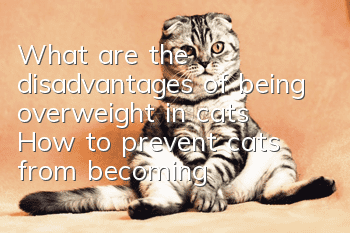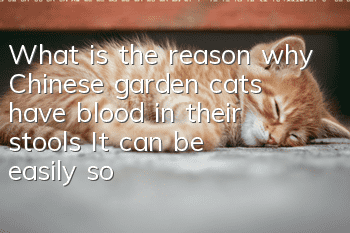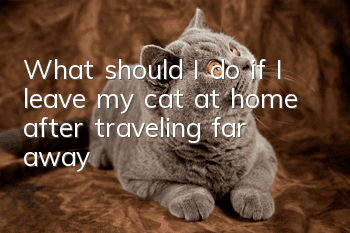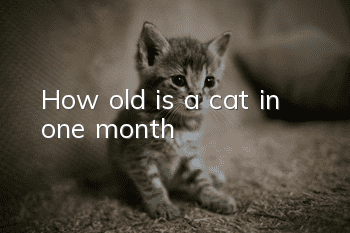What are the disadvantages of being overweight in cats? (How to prevent cats from becoming obese?)

Now cats have long become one of our most popular pets. Cats are very cute animals and their behavior is also very interesting to people. Raising a cat is also very good for us to vent the stress in life, because they often bring you a lot of fun in your life, and sometimes they will do many cute things to make you happy. laugh. Although cats look very cold, they still have you as their master in their hearts, and they will also be very loyal.
Because of the many advantages of cats, cats have also become the objects of people's pampering. Many cats will suffer from some problems because of the pampering of our country. So because humans love cats, they will suffer from many diseases. What are the causes of these diseases? The most likely consequence of pampering cats is that cats will become obese. Excessive obesity in cats is a major cause of their diseases. Cats will become obese just like humans, and they will suffer from many diseases caused by obesity, such as hyperlipidemia. Heart disease and more.
Nowadays, the phenomenon of cat obesity has become very common. "Is my cat fat?" This question is not just a question that people think of. In fact, obese and overweight cats are actually more common than cats with a normal healthy weight. According to some, more than half of cats are overweight and about 25% are obese. What's more, if you're asking if your adorable kitten is fat, then you probably have a reason for being curious, and perhaps, you may already know the answer. But, to be sure, here is some information on how to tell if your cat is overweight or obese and how to fix the problem.
Symptoms and signs of excessive obesity in cats. The average weight of a domestic cat should be about 8 to 10 pounds. Of course, depending on the breed, the ideal weight can vary according to different criteria. For example, a Maine Coon can weigh 25 pounds and be perfectly healthy. However, there are some signs of obesity in cats, including unhealthy eating habits, lack of interest in physical activity, and excessive weight gain. If you suspect your kitten may be obese, here are some things pet parents can do to see if their cat is a healthy weight or if they are predisposed to obesity: Place your hands on the cat's sides and pet them, You should be able to feel their ribs.
Your cat may be overweight if you can't feel their ribs. Stand over the cats and look at them. You should be able to identify their girth, a slight indentation behind the ribs. If there is no indentation, your cat may be overweight or even obese. Take a look at your cat's stomach. Swinging pouches between their hind legs can be a sign of an overweight cat. Check your cat's back. If they have greasy hair, fuzzy fur, or flaky skin, they may be overweight and unable to clean their body parts. Concerned pet parents can also take their kittens to the veterinarian for a body condition score check.Standard weight test.
Also, if you already think your cat is obese, you should stay in touch with your veterinarian just to be safe. Causes of Cat Obesity So, how do kittens become obese? Well, there are several reasons why a cat can lose weight. Obesity itself is defined as the storage of extra fat in the body. The concern isn't even about weight, but the characteristics of weight gain. Typically, cats become obese in one of two ways: illness/disease and overeating. Illness or Disease If your kitten is showing signs of weight gain, there may be an underlying health problem.
Cat obesity can be caused by certain conditions, including: Hypothyroidism Insulinoma Excess adrenocorticosteroids, also known as Cushing's disease If you suspect your cat is suffering from one of these or other medical-related conditions If your dog is gaining weight, take them to the veterinarian for a checkup. Need help finding a veterinarian or clinic? Use our vet finder. Overeating and Inactivity Every feline species is equally prone to weight gain and obesity. However, lifestyle and gender can have an impact on a cat's weight gain. On average, neutered males who live indoors are most likely to become overweight or even obese.
This is not because their status has changed, but because their caloric intake requirements have decreased and the amount of food provided has not. While living indoors helps keep cats safe, and is recommended by our strategic partners the Society for the Prevention of Cruelty to Animals, it can limit cats' movements and provide them with regular and sometimes constant access to meals. This lifestyle is very different from their ancestors who were forced to forage for meals, as food was often scarce. If your cat has unlimited access to food, a practice often called "free feeding," it may help with weight gain. Action Plan If you think your cat is obese, or slightly overweight, talk to your veterinarian and work with them to develop a plan of action.
You want to make sure you're taking a safe approach to weight loss, one that focuses on gradual improvement. However, it is important that you take action because obesity in cats can lead to other conditions such as diabetes, hepatic lipidosis, osteoarthritis, respiratory problems, heart disease, liver disease, and more. Obesity and overweight can also have a negative impact on your kitten's lifespan. Fortunately, the key to getting your cat back in shape and reducing the likelihood of exacerbating the problem is no different than trying to get yourself into a better condition. These are two magic words: "diet" and "exercise."
If you really can’t help your cat lose weight, then you should consult a veterinarian. The veterinarian can also give you a lot of very useful suggestions that can help you and your cat. They will be better than You are more experienced, and they know better than you how to make your cat lose weight more healthily. So when it comes to cat weight loss, it’s also a good idea to ask your veterinarian.Very good idea.
The obesity of cats should attract our attention now. We should not let us pamper them too much and cause them to become excessively obese, because excessive obesity will lead to health problems in our cats, which is equivalent to harming our cats ourselves. We should focus on diet and exercise, control our cats’ diet, and try to reduce their diet to ensure that they are healthy. In terms of exercise, we should guide our cats to do more exercises so that they can lose weight as soon as possible. They are happier and healthier.
- What age should a Himalayan cat be neutered?
- Can cats be kept in cages?
- How long does it take for a cat to be fed and watered after being neutered?
- Three steps to teach you how to take good care of your cat’s hair
- Do cats need to be fed at a fixed time? Cat feeding time!
- B vitamins and cat health, what you should know!
- How to train a cat? Training a cat requires the correct stimulation method!
- How to help Garfield cat lower its body temperature when the weather is too hot?
- Why does a cat’s stomach growl?
- Learn the tips for raising Ragdoll cats and identify whether the feeding method is correct or not



